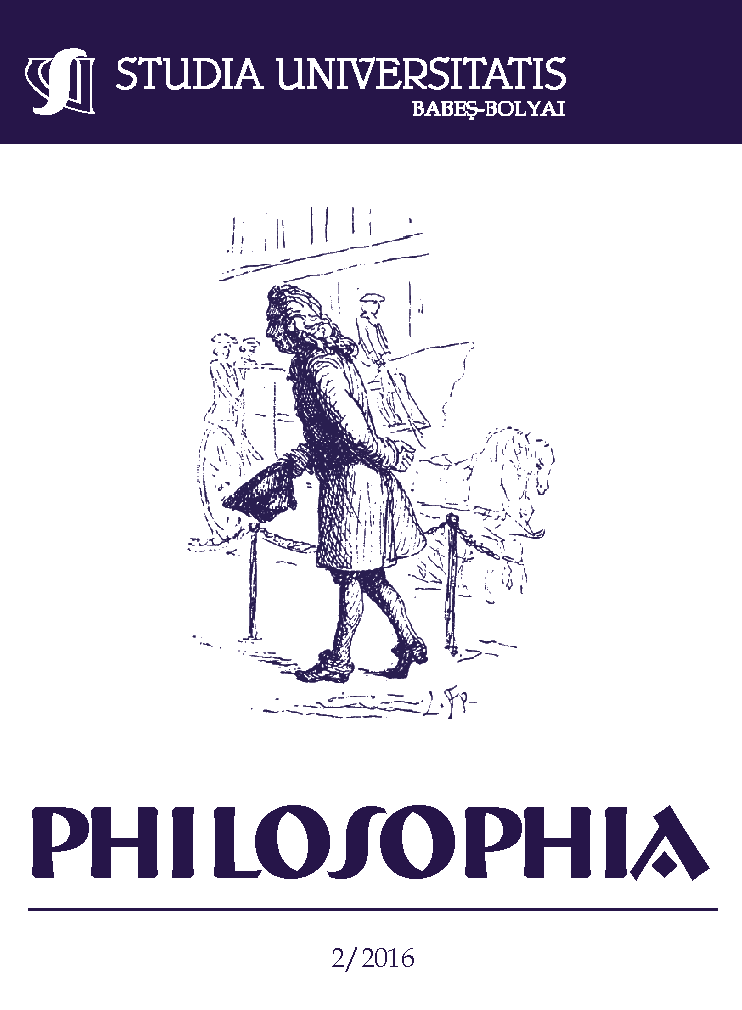GESUNDHEIT UND WELTVERSTÄNDNIS. HANS GEORG GADAMERS PHILOSOPHISCHE AUSEINANDERSETZUNG MIT DER MEDIZIN
Keywords:
body, health, disease, death, medicine, phenomenology, hermeneutics.Abstract
Health and World-Comprehension. Hans Georg Gadamer‘s Philosophical Approach to Modern Medicine. The text focuses primarily on Gadamer’s essays surrounding the phenomenology of health. As a starting point, health has to be defined as a philosophical problem – this is what the text does by presenting different interpretations on the concept (Friedrich Nietzsche, Aaron Antonovsky or World Health Organization). Every single attempt to define health presents either the difficulty of not being entirely free of negative determination (such as the absence of disease) or it looses it’s complete reliability by including the subjective view of the individual. What exactly causes the loss of the feeling of well-being, when the physical symptom remains absent? Gadamer’s rather complex view on the entire phenomenon “health” includes the discussion with the Greek Antiquity. The other line of tradition included in the discussion is the phenomenology of Husserl and Heidegger. Gadamer shows, leaning on Heidegger, that one very important aspect within the understanding of health is the integration of negativity: pain, anxiety or disease, the death of the other are not to be seen as strange or absurd phenomena, but as belonging to life itself. One’s “health” depends on how the individual understands this kind of negativity and integrates it into his whole view on the surrounding “world”. This, following Gadamer (and Viktor von Weizsäcker) can happen only by going through the negative experience by acknowledging it as a part of personal history and not by choosing to ignore it or simply “cure it away”: pain or disease are hermeneutical “problems” as much as medical issues and they have to be understood on both sides, as well on the side of the physician as on the patient’s side in order to be treated in a complete manner. In other words, against a technical view on the human body, Gadamer argues that it is nature itself that has to be helped and allowed to restore the fine balance between the individual and his world which, ultimately, seems to be one of the keys to the “enigma of health”
References
J. Bengel, Was erhält Menschen gesund? Antonovskys Modell der Salutogenese-Disskussionsstand und Stellenwert, eine Expertise von J. Bengel, R. Strittmatter, H. Willmann. Im Auftrag der BZgA, Bundeszentrale für gesundheitliche Aufklärung, Köln BZgA 2001, „Forschung und Praxis der Gesundheitsförderung“, Band 6, S. 34, www.bug-nrw.de/cms/upload/pdf/entwicklung/Antonowski.pdf.
Hans Georg Gadamer, Über die Verborgenheit der Gesundheit, Suhrkamp Verlag, Frankfurt am Main, 2. Auflage 2003.
Hans Georg Gadamer, Schmerz. Einschätzungen aus medizinischer, philosophischer und therapeutischer Sicht, Universitätsverlag WINTER Heidelberg, 2003.
Martin Heidegger, Sein und Zeit, Niemeyer Verlag, Tübingen, 12. Auflage 1972.
Fr. Nietzsche, Menschliches, Allzumenschliches, KSA 2, Vorrede 4.
Platon, Phaidros, Werke V, Hrsg. von Gunther Eigler, Wissenschaftliche Buchgesellschaft, 4. unveränderte Auflage, 2005.
Viktor von Weizsäcker, Warum wird man krank? Ein Lesebuch-Suhrkamp, 2008 (aus dem Nachlass V.v. Weizsäcker).
Allgemeine Sekundärliteratur
Damir Barbaric, Aneignung der Welt. Heidegger, Gadamer, Fink, „Reihe der Österreichischen Gesellschaft für Phänomenologie“, Hrsg. Helmuth Vetter, Band 14, Europäischer Verlag der Wissenschaften, Frankfurt a.M, 2007.
Franz Bernhard, Der Kopf, in Hans Georg Gadamer, Denken im Gedicht, Hrsg. Erich Thies, Edition Cantz, Stuttgart, 1990.
Olaf Breidbach, Giuseppe Orsi (Hg.) Ästhetik, Hermeneutik, Neurowissenschaften, Heidelberger Gadamer-Symposium des Instituto Italiano per gli Studi Filosofici, Lit Verlag Münster, 2004.
Hans Georg Gadamer, Wahrheit und Methode, Gesammelte Werke 1, Mohr Siebeck, Tübingen, 1990.
Hans Georg Gadamer, Gesammelte Werke 2, Mohr Siebeck, Tübingen, 1993.
Gadamer’s Century – Essays in Honor of Hans-Georg Gadamer, edited by Jeff Malpas, Ulrich Arnswald and Jens Kertscher, MIT Press, Cambridge Massachusets, London, England, Massachusetts Institute of Technology, 2002.
Psychoanalyse heute und vor 70 Jahren, Heinz Weiß, Hermann Lang (Hg.), 1996, Tubingen: edition diskord (Hans Georg Gadamer, Hermeneutik-Theorie und Praxis, S. 359-369).
Lawrence Kennedy Schmidt, The Epistemology of Hans Georg Gadamer: an analysis of the legitimization of Vorurteile, Frankfurt am Main, Bern, New York: Lang, 1985 (“European University Studies”, Ser. 20, Philosophy, vol. 161).
Sein, das verstanden werden kann, ist Sprache. Hommage an Hans Georg Gadamer, Suhrkamp, 2001.
Downloads
Published
How to Cite
Issue
Section
License
Copyright (c) 2016 Studia Universitatis Babeș-Bolyai Philosophia

This work is licensed under a Creative Commons Attribution-NonCommercial-NoDerivatives 4.0 International License.





